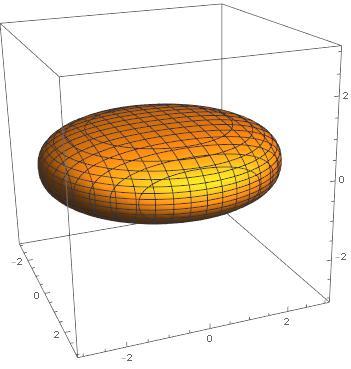What is the volume of this shape?
This problem’s question: What is the volume of this shape?
This problem, since only a numeric answer is needed, is most easily solved by a numeric integration.

The formula for the shape: 0 . 0 6 4 1 5 0 0 2 9 9 0 9 9 5 8 4 ∣ ∣ x 2 + y 2 ∣ ∣ 1 . 2 5 + ∣ z ∣ 2 . 5 ≤ 1 .
The accuracy of the first numeric value is far in excess of what is needed. Use as much as you think you need.
The answer is 42.4131047962912.
This section requires Javascript.
You are seeing this because something didn't load right. We suggest you, (a) try
refreshing the page, (b) enabling javascript if it is disabled on your browser and,
finally, (c)
loading the
non-javascript version of this page
. We're sorry about the hassle.
2 solutions
Thank you.
The original form of a is 9 3 1 .
With the original form of a and using the methodology you apparently used, I came to dissimilar looking solution, but mathematically the same: − Γ ( − 5 4 ) Γ ( 5 1 1 ) 1 8 2 + 5 2 π 2 Γ ( 5 7 ) .
I have registered a problem report (4272791) with Wolfram. Numerically, the answer to the problem is too dissimilar to the correct answer. The numeric answer to the symbolic form is 42.4131047962912.
I now see that Wolfram/Alpha returns your form of the definite integral (after moving outside the integration the constant terms): ∫ 0 1 ( 1 − z 5 / 2 ) 4 / 5 d z = 3 π 2 2 2 / 5 Γ ( 1 0 7 ) Γ ( 5 4 ) .
The indefinite integral is: 3 1 z ( 2 2 F 1 ( 5 1 , 5 2 ; 5 7 ; z 5 / 2 ) + ( 1 − z 5 / 2 ) 4 / 5 ) .
Volume ⎣ ⎡ ImplicitRegion ⎣ ⎡ Evaluate [ ∣ ∣ h z ∣ ∣ p + ∣ ∣ ∣ ∣ r x 2 + y 2 ∣ ∣ ∣ ∣ p /. { p → 2 . 5 , r → 3 . , h → 1 . } ] ≤ 1 , ⎝ ⎛ x y z − 3 − 3 − 3 3 3 3 ⎠ ⎞ ⎦ ⎤ ⎦ ⎤ ⇒ 4 2 . 0 7 0 5 8 4 5 2 3 9 1 7 9
Please, see my comments on D G's solution.
Let a = 0 . 0 6 4 1 5 0 0 2 9 9 0 9 9 5 8 4 . We can rewrite the equation as
∣ x 2 + y 2 ∣ ≤ ( a 1 − ∣ z ∣ 5 / 2 ) 4 / 5
This is just a circle in the x-y plane. Our volume is then
2 ∫ 0 1 a 5 4 π ( 1 − z 2 5 ) 5 4 d z = 3 a 5 4 4 ⋅ 2 5 2 π Γ ( 1 0 7 ) Γ ( 5 4 )
Substitute the value of a to get the final result.